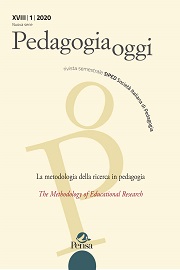Editoriale
DOI:
https://doi.org/10.7346/PO-012020-01Abstract
The editorial analyzes the history of the scientific method, up to its crisis in the field of
human sciences. Then, it analyzes the current situation in the theory of education, which
is characterized by a methodological pluralism and the need for a principle of unitary understanding.
The current educational historiography mirrors the multiplicity of approaches
and methods in this field. The analysis and study of the sources, which are often
quite unusual, have been conducted either with well known methodologies (such as narrative
and qualitative methods) or more recents and experimental ones (such as structural
and quantitative methods). These latter, in particular, can prove to be effective but require
a great deal of critical attention. Among the current study objects of the special education
field, the theme of disability assumes many facets. Subsequently, it supports a reflection
on the need for a conscious adoption of targeted authoritative methodological
paradigms, inspired by the rigor of research, as well as on ethical issues related to the direct
participation of persons with disabilities. Moreover, the link between epistemological
and methodological aspects of pedagogical research is outlined. The variety of paths
of pedagogical research methods brings to the fore some epistemological, methodological,
ethical and political issues that deserve attention to avoid the pitfalls that threaten
pedagogical research.




